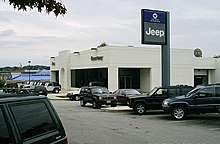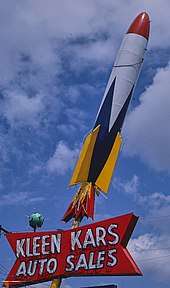Used car
A used car, a pre-owned vehicle, or a secondhand car, is a vehicle that has previously had one or more retail owners. Used cars are sold through a variety of outlets, including franchise and independent car dealers, rental car companies, buy here pay here dealerships, leasing offices, auctions, and private party sales. Some car retailers offer "no-haggle prices," "certified" used cars, and extended service plans or warranties.

Used car industry
With annual sales of over US$350 billion, the used vehicle industry represents almost half of the U.S. auto retail market and is the largest retail segment of the economy. In 2016, about 17.6 million used cars and trucks were sold in the United States, and 38.5 million were sold worldwide.[1]
History
Established in 1898, the Empire State Motor Wagon Company in Catskill, New York was one of the very first American used car lots.[2]
The used vehicle market is substantially larger than other large retail sectors, such as the school and office products market (US$206 billion in estimated annual sales) and the home improvement market (US$291 billion in estimated annual sales).
Used vehicle retailer

The Federal Trade Commission recommends that consumers consider a car retailer’s reputation when deciding where to purchase a used car.
Vehicle history reports
In 2006, an estimated 34% of American used-vehicle buyers bought a vehicle history report.[3] Vehicle history reports are one way to check the track record of any used vehicle. Vehicle history reports provide customers with a record based on the vehicle's serial number (VIN). These reports will indicate items of public record, such as vehicle title branding, lemon law buybacks, odometer fraud, and product recall. The report may indicate minor/moderate collision damage or improper vehicle maintenance. An attempt to identify vehicles which have been previously owned by hire car rental agencies, police and emergency services or taxi fleets is also made. Consumers should research vehicles carefully, as these reporting services only report the information to which they have access.
In some countries the government is a provider of vehicle history, but this is usually a limited service providing information on just one aspect of the history, such as the MOT history. The U.S. Department of Justice's National Motor Vehicle Title Registration System has only about a dozen approved data providers, about half of which sell car history data to consumers; the rest work only with car dealers. None of them are currently free of charge to consumers and many are not free even to the car dealers. [4] The Better Business Bureau recommends using one of these approved data providers when researching a used car.[5] The history reports use several sources to gather the data for each vehicle including, the police, DVLA, finance houses, the national mileage register, insurance companies and industry bodies.[6]
Several of the services, most notably those in the United Kingdom and the United States, sell reports to dealers and then encourage the dealers to display the reports on their Internet sites. These reports are paid for by the dealer and then offered for free to potential buyers of the vehicle.
In the UK, the DVLA provides information on the registration of vehicles to certain companies for consumer protection and anti-fraud purposes. Companies may add to the reports additional information gathered from police, finance and insurance companies. Car history check services are available online for the public and motor trade customers. In India Parivahan a Government owned ministry of Road and Transport highway authority is responsible for providing information related to Vehicle Registration and Service History.[7]
Used car pricing
Used car pricing reports typically produce three forms of pricing information.
- Dealer or retail price is the price expected to pay if buying from a licensed new-car or used-car dealer.
- Dealer trade-in price or wholesale price is the price a shopper should expect to receive from a dealer if trading in a car. This is also the price that a dealer will typically pay for a car at a dealer wholesale auction.
- Private-party price is the price expected to pay if buying from an individual. A private-party seller is hoping to get more money than they would with a trade-in to a dealer. A private-party buyer is hoping to pay less than the dealer retail price.
The growth of the Internet has fueled the availability of information on the prices of used cars. This information was once only available in trade publications that dealers had access to. There are now numerous sources for used car pricing. Multiple sources of used car pricing means that listed values from different sources may differ. Each pricing guide receiving data from different sources and makes different judgments about that data.
Pricing of used cars can be affected by geography. For example, convertibles have a higher demand in warmer climates than in cooler areas. Similarly, pickup trucks may be more in demand in rural than urban settings. The overall condition of the vehicle has a major impact on pricing. Condition is based on appearances, vehicle history, mechanical condition, and mileage. There is much subjectivity in how the condition of a car is evaluated.[8]
There are various theories as to how the market determines the prices of used cars sold by private parties, especially relative to new cars. One theory suggests that new car dealers are able to put more effort into selling a car, and can therefore stimulate stronger demand. Another theory suggests that owners of problematic cars ("lemons") are more likely to want to sell their cars than owners of perfectly functioning vehicles. Therefore, someone buying a used car bears a higher risk of buying a lemon, and the market price tends to adjust downwards to reflect that.[9]
Laws and regulations
Geographically specific laws
Australia
In the Australian state of Queensland, when the odometer reading is fewer than 160,000 kilometres (99,000 mi), and the car was manufactured less than 10 years before the sale date, the warranty is three months or 5,000 kilometres (3,100 mi), whichever happens first. If the odometer reading is 160,000 kilometres (99,000 mi) or more, or the car was manufactured 10 years or more before the sale date, there is no warranty. Also, motorcycles, caravans and commercial vehicles don't have a warranty at all. A commercial vehicle is a Vehicle is a car with nine seats or more, as well as a vehicle that is able to carry one tonne of goods, unless it is a utility, which is a car designed to carry goods. For example a Holden Commodore Utility or a Ford Falcon Utility. As these are cars that come with the back section being part of the car's body. Other vehicles that have inter-changeable back section are regarded as Cab Chassis and the back of the vehicle can be order from the factory or can be custom built to suit the needs of the vehicle buyer. The same as a light truck can be ordered as a tip truck or a body truck
Canada
In Ontario, Canada, new and used vehicle sales are regulated by the Ontario Motor Vehicle Industry Council (OMVIC). In Alberta, Canada, new and used vehicle sales are regulated by the Alberta Motor Vehicle Industry Council (AMVIC).
China
European Union
Used cars have a statutory warranty according to the system of laws of the European Union, the so-called "Liability for defects", which lasts for 12 months.
Japan
USA
See also
- Certified Pre-Owned
- Car supermarket
- Grey import vehicle
- Decrepit car
- Lemon (automobile)
References
- "Market Report" (PDF). dealers.edmunds.com. 2017.
- Flammang, James M. (1999). 100 Years of the American Auto: Millennium Edition. Publications International. ISBN 9780785334842.
- "J.D. Power and Associates Reports: Vehicle History Reports Are Becoming Increasingly Important to Used-Vehicle Buyers". Theautochannel.com. Retrieved 2010-08-15.
- Research Vehicle History; Approved NMVTIS Data Providers, U.S. Department of Justice, National Motor Vehicle Title Registration System
- Selling a Car? Watch Out for Fake Buyer Trying to Trick you into Buying Questionable Vehicle History Report, Better Business Bureau, April 5, 2016
- "HPI Check - Used car history check, UK's No 1 - checks for Finance / Write off / Mileage discrepancy". HPICheck.
- Parivahan.com
- "Kelley Blue Book - MSN Autos". Autos.msn.com. 2010-02-22. Archived from the original on 2011-08-10. Retrieved 2010-08-15.
- McKenzie, Richard B. (2008). Why Popcorn Costs So Much at the Movies: And Other Pricing Puzzles. Copernicus Books. pp. 9–31. ISBN 9780387769998.
External links
- Ontario Vehicle Information Package offers Ontario vehicle registration history
- Saskatchewan Damage Claims History Search provides the status of the vehicle (if any) in Saskatchewan and its damage claims history in Saskatchewan since Jan. 1, 1998.
- Federal Trade Commission
- Vincheck VIN checking in the U.S.
- Rules about statutory warranties for selling used vehicles in Queensland : Department of Justice and Attorney-General